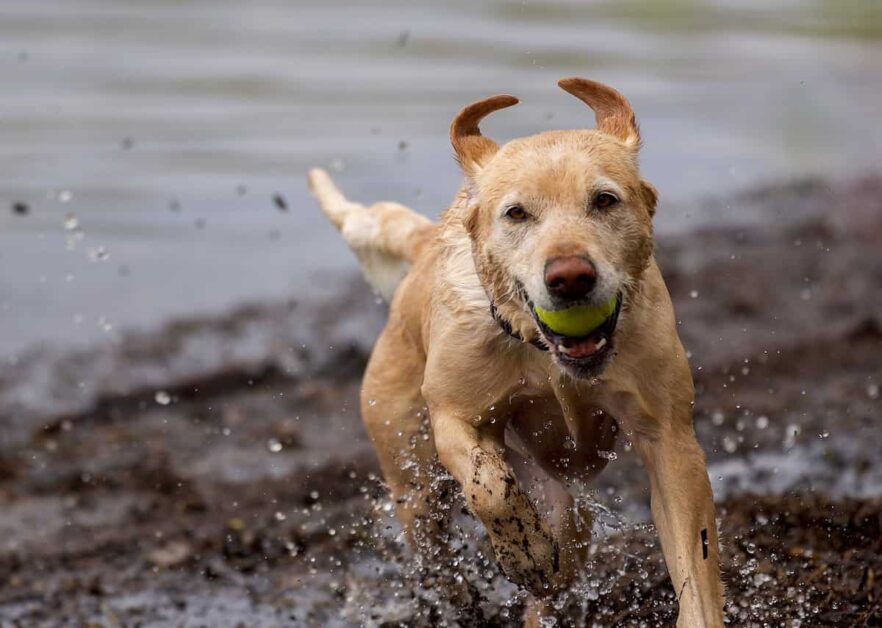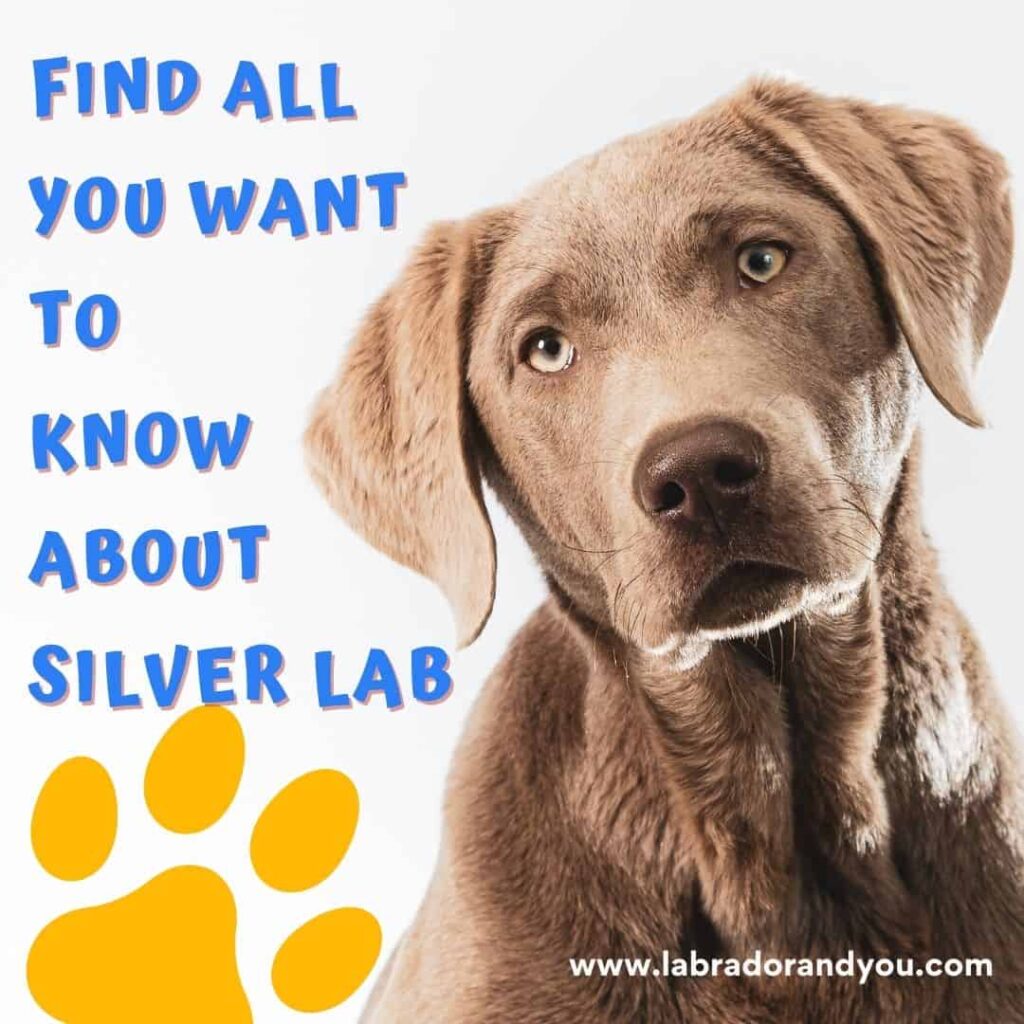Bringing labrador retriever puppies home is an exciting experience. Equipping your new lab puppy with the proper collar is essential for their comfort and safety. When you bring a puppy home, they grow rapidly in their first few months. Choosing the perfect collar size can be tricky, but worry not – we’ll ensure your lab’s collar fits! So what size collar for a lab puppy is right? Today, we’ll discuss
- What size collar best fits a lab puppy,
- How to accurately measure your dog’s neck and
- Explore various materials and types to ensure maximum comfort as they grow.
- Collars that can withstand a puppy’s playful antics
Puppy Collar Size Guide For Dog’s Head
Measure the pup’s neck and ensure that the collar fits snugly but not too tight, with enough room for two fingers to fit in between. Here’s a general guide to help you choose the right collar size for your puppy’s head:
- Measure the circumference: Use a flexible measuring tape or a string around the widest part of your puppy’s head, just above the ears and under the jawline. Make sure the tape or string is snug but not too tight.
- Add extra space: Once you have the measurement, add approximately 1-2 inches (2.5-5 cm) to the total. This additional space allows for some growth and ensures that the collar won’t be too tight.
- Consult a size chart: Different collar manufacturers may have slightly different sizing guidelines. So referring to their specific size chart is helpful.
- Check adjustability: Pay attention to whether the collar is adjustable or comes in various sizes. Adjustable collars that offer a proper fit are more forgiving if your puppy’s head size changes as they grow.
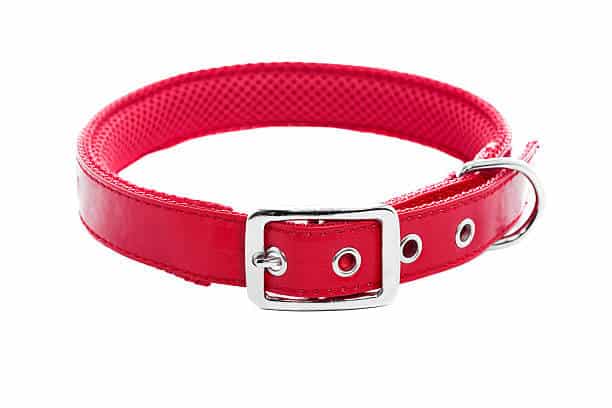
How Can You Figure Out the Correct Collar Size?
Determining if your Lab puppy’s collar fits properly can be done with a simple technique called the two-finger rule.
- First, place the collar around your puppy’s neck, ensuring it is snug but tight.
- Then, try to slide two fingers between the collar and your dog’s neck.
Remember that Labrador puppies grow at different rates. Hence, measuring your pup’s neck a few inches down from its head and adding about two extra inches will help determine the right size. Monitoring their growth frequently as they mature is a must.
Benefits Of A Properly Fitted Collar For A Lab Puppy
A properly fitted collar for a lab puppy is crucial for various reasons: providing comfort, maximizing safety, and promoting healthy growth. One key benefit of a well-fitted collar is that it prevents the risk of choking or injury to your furry friend.
Another advantage of using the correct collar size is that it makes training your young labrador easier and more effective. A snug but not too tight fit lets you control your puppy during walks without hurting them, ensuring they develop good walking habits early on.
Collars with reflective materials can also improve visibility during night walks, safeguarding you and your pup from accidents.
How To Decide If Your Puppy’s Collar Needs Replacing?
Regularly assessing your lab puppy’s collar is essential for maintaining their comfort. As a general rule of thumb, it’s time to replace the collar when you can no longer fit two fingers between the collar and your puppy’s neck comfortably. OR if you’ve reached the end of the adjustable strap without achieving a snug fit.
Another significant indicator is visible wear and tear on the current one. This could include frayed edges, stretched-out material, or malfunctioning clasps – all signs that it won’t provide proper support during walks or playtime.
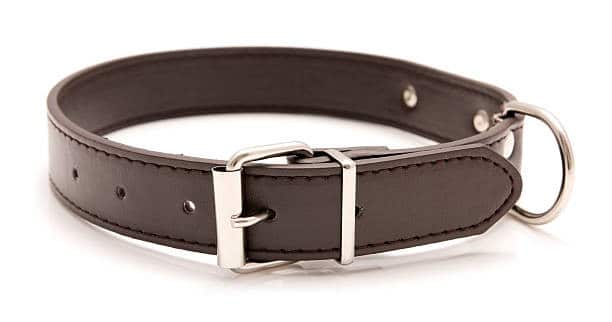
Adult Labrador Dog’s Neck Size
Regarding collars for adult labradors, the collar length will depend on your dog’s neck size. For dogs between 26 and 55 pounds, the collar length should be between 13 to 18 inches. Not all labs have the same neck size; some may require larger or smaller collars. Measuring your dog’s neck is always best before buying a new collar. Additionally, when fitting an adult dog with a collar, ensure it is snug but not too tight.
A right-sized collar can prevent injury and discomfort for your labrador retriever. A well-fitted collar can ensure proper control while walking or training your dog without restricting breathing or movement.
Collar Materials
Different materials that can make up lab puppy collars include biothane, neoprene, and leather.
Biothane
Biothane is a synthetic polyurethane-type material that is becoming popular for fabric collars. It’s highly durable, waterproof, and can withstand extreme temperatures. In addition to being easy to clean, it doesn’t absorb odors like fabric or leather collars.
Biothane collars are also lightweight and flexible, making them comfortable for dogs to wear for extended periods. Moreover, they come in different sizes and colors.
Neoprene
Neoprene is a popular collars material known for its durability, strength, and water resistance. These synthetic polyurethane-type materials can handle the rough-and-tumble play of active dogs like labs who enjoy running through water or snow.
Neoprene collars are soft and lightweight, making them comfortable for your pup to wear all day without irritation. Also, neoprene is easy to clean with just a damp cloth. This feature makes it an ideal choice if you want less maintenance when caring for your dog’s collar.
Leather
Leather collars are popular for lab puppies due to their durability and classic look. Genuine leather is an excellent collar material because it’s sturdy, long-lasting, and can withstand rough playtime. Leather’s natural, breathable properties also mean your puppy won’t get hot and sweaty around the neck area while wearing it.
Although they may cost more than other materials, good quality leather puppy collars will last you years before needing replacement. Leather collars come in different styles, such as padded ones that provide extra comfort for your pup while training or walking.
How To Plan For A Growing Labrador Puppy?
Lay The One Collar Myth To Rest
It is a common misconception among dog owners that one collar will suffice for their growing puppy. However, this doesn’t fit in when it comes to labrador puppies. Lab puppies grow at different rates, and the size of their necks can vary greatly depending on age and weight.
Planning for a growing puppy and investing in multiple collars throughout its development is essential. Finding a collar with room for your puppy to grow into ensures they remain comfortable and safe as they mature. You can avoid discomfort by regularly measuring your pup’s neck and getting appropriately sized collars, such as choking or skin irritation.
Find A Collar That Leaves Room For Your Puppy To Grow
Labrador puppies grow quickly, and their collar size can change within a few weeks. When selecting a collar for your lab puppy, choose one that leaves room for growth while still fitting correctly.
Avoid the common misconception of purchasing just one collar for your pup that they will wear throughout their life. This approach doesn’t account for the puppy’s growth rate.
Instead, opt for an adjustable collar or one with multiple sizing holes to ensure you get the right fit at every stage of your dog’s development. Measure your puppy’s neck regularly and adjust the collar to ensure it never becomes too tight and restricts breathing.
Size Your Puppy Regularly
It’s essential to regularly size your lab puppy’s collar, even after finding the perfect fit. Puppies grow rapidly in their first few months, and it doesn’t take long to outgrow their collars.
A collar that fits too tightly can cause injury, while a loose one may slip off during a walk or become caught on something.
It’s best to check weekly by slipping two fingers between the collar and your puppy’s neck. If there isn’t enough room for this space, it’s time to adjust the collar size accordingly.
Considering A GPS Collar
If you’re concerned about losing your lab puppy or want to keep track of them when they wander off, a GPS collar may be worth considering. These collars come with tracking devices allowing you to locate your pup’s whereabouts anytime.
While GPS collars can provide added peace of mind for pet owners, you can’t rely on them as the only means of keeping tabs on your furry friend.
A well-fitted collar with identification tags is still essential if your pup gets lost without their GPS device. Some trainers caution against using electronic training collars that mimic shocks and vibrations as they harm dogs and do not build trust between the owner and the pet.
Different Dog Collar Options For Labs
Blueberry: best collar for 8 week old puppy
Made from high-density polyester webbing, this collar provides durability and comfort for your furry friend. It comes in various colors and patterns to match your pup’s personality.
The Blueberry puppy collar for lab puppy checks all these boxes with its sturdy construction and reflective threads stitched into the webbing to provide visibility during nighttime walks or activities.
Blueberry Pet Classic Nylon Adjustable Collar
The Blueberry Collar is known for its durability and affordability. This collar comes in various sizes, including sizes suitable for growing puppies.
It is made of high-quality nylon material that can withstand wear and tear from active pups. The adjustable feature allows pet owners to comfortably fit the collar according to the puppy’s neck size. It also comes in various colors and patterns, which means they serve a practical and fashionable purpose.
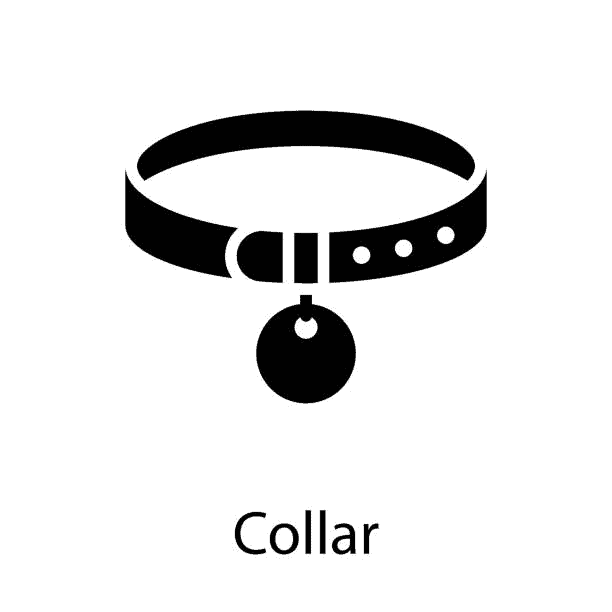
Puppy Whelping Collars For Newborns
Puppy whelping collars are small, soft collars designed for newborn puppies. These collars help identify the puppies in a litter to ensure that each one gets proper care and attention.
They also allow a dog owner to keep track of individual puppy weight gain and monitor any potential health issues. Puppy whelping collars should be lightweight, adjustable, easy to clean, and made from non-irritating materials such as soft nylon or neoprene.
CollarDirect Reflective Dog Collar
The CollarDirect Reflective Dog Collar is an excellent option for ensuring your lab puppy stays safe while out on walks. This collar comes in various colors and sizes, making it easy to find the perfect fit for your furry friend.
It’s made with high-quality nylon webbing that provides durability and can withstand even the most active dogs. The collar also features reflective stitching, which makes it visible at night or in low-light conditions, adding another layer of safety.
Joytale Reflective Dog Collar
The Joytale Dog Collar for lab puppy is an adjustable collar made of durable and comfortable nylon webbing.
- The collar features a reflective stripe that makes your puppy visible during low-light conditions.
- It also has a secure buckle that stays fastened even if your pup pulls or tugs on the leash.
- One essential feature is its ability to provide comfort and security while being stylish at the same time.
- Its bright colors make your furry friend stand out from other dogs in the park, while its lightweight design guarantees they won’t feel weighed down.
Are Training Adjustable Collars A Good Idea?
Training collars, such as choke chains and prong collars, are controversial among dog owners. While some trainers believe they can be effective training tools when used correctly, others argue they can cause dog pain and injury. Before considering using a training collar on your lab puppy, evaluate why you want one in the first place.
If you’re looking for an easy way out or think it’ll provide immediate results without putting effort and time into proper training techniques, then it’s best not to go down this route. Positive reinforcement methods like using treats or toys are more humane and less invasive options worth exploring.
Always prioritize your pup’s safety regardless when selecting his collar type. Thus, make sure any training collar fits correctly so as not to harm him while being efficient at the same time.
Standard Collar, Harness, Or Both?
There is no one-size-fits-all answer when choosing between a collar or harness for your lab puppy. Both have their advantages and disadvantages.
- A collar is ideal for attaching identification tags and leashes and providing comfort for your dog’s neck.
- However, a harness may be more suitable if your puppy pulls on the leash or has breathing issues.
The collar should sit snugly around their necks without being too tight. Choosing a collar, harness, or both depends on what works best for you and your pup’s unique needs.
Puppy Collar FAQs
When Should A Puppy Wear A Collar?
It is ideal for a puppy to wear a collar when they come home with you. This will help them get used to wearing one and also serve as identification if the pup were ever to escape or get lost.
Can An 8-week-old Puppy Wear A Collar?
Yes, an 8-week-old puppy can wear a collar. It is recommended that puppies wear collars when they are young to get used to the feeling of wearing one. Choosing a flat collar with adjustable straps is best to loosen as your pup ages.
Should Puppies Wear Collars At Night?
It is generally safe for puppies to wear collars at night. It helps identify them if they wander off or get lost.
What Information Should I Put On My Puppy’s Dog Collar Tag?
Your puppy’s dog collar tag should have identifiable information to help you reunite with your furry friend if they get lost. Including your name, phone number, and address on the tag is recommended.
Consider adding information about any medical conditions your puppy may have or if they require medication. Another option is to add a microchip to your puppy’s collar, which can provide more detailed identification information.
Which Collar Size Is Best For My Puppy?
A good rule of thumb is to measure a few inches down from their head and add two inches, ensuring the collar fits snugly but not too tightly. If your labrador puppy is eight weeks old and weighs around 16 pounds, it may require an 11-12 inches long collar.
Are Dogs Better Off With Wide Collars?
While some dog owners prefer wide collars for their furry friends, it’s not necessarily better or worse than any other type of collar. The most critical factor is ensuring the collar fits correctly and comfortably.
Some dogs with larger necks may benefit from wider collars to distribute pressure more evenly, while smaller breeds do well with slimmer options. A wide collar may be suitable if your dog pulls on their leash as they can lessen the risk of choking.
Does My Labrador Puppy Need A Smaller Collar?
Watch your labrador puppy’s collar as it grows and develops. Puppies’ necks are delicate, so a too-tight or ill-fitting collar can be uncomfortable. Generally speaking, puppies need a smaller collar than adult dogs, but their neck size varies depending on breed and age.
Author Profile
- Site Owner And Dog Lover
-
Aritra, the founder of Labradorandyou.com, is a lifelong dog lover whose passion ignited for Labradors for their loyalty and intelligence. With extensive research and personal experiences, Aritra has become a Labrador expert, offering a rich resource on the breed. Labradorandyou.com provides reliable, timely, and evidence-based information, including Labrador-specific product reviews, training techniques, and care tips.
Labradorandyou.com was born out of Aritra's passion and his desire to share his profound knowledge about the breed. The site serves as a comprehensive resource, offering a wealth of up-to-date information for Labrador owners and enthusiasts alike
Also by the author
-
 Lab-TypesNovember 17, 2023Old Dog Seizures: Causes, Symptoms, and Treatment Options
Lab-TypesNovember 17, 2023Old Dog Seizures: Causes, Symptoms, and Treatment Options
-
 Lab-TypesNovember 17, 2023Why Is My Dogs Poop Yellow? 8 Reasons & Solutions
Lab-TypesNovember 17, 2023Why Is My Dogs Poop Yellow? 8 Reasons & Solutions
-
 ReviewsNovember 17, 2023The Only Hill’s Science Diet Review You Need To Read
ReviewsNovember 17, 2023The Only Hill’s Science Diet Review You Need To Read
-
 Lab-TypesNovember 17, 2023How To Adopt An Emotional Support Dog?
Lab-TypesNovember 17, 2023How To Adopt An Emotional Support Dog?
